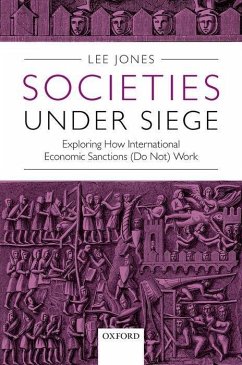Today, international economic sanctions are imposed in response to virtually every serious international crisis, whether to promote regime change and democratisation, punish armed aggression, or check nuclear proliferation. But how exactly is the economic pain inflicted by sanctions supposed to translate into political gain? What are the mechanisms by which sanctions operate - or fail to operate? This is the first comparative study of this vital question.
Drawing on Gramscian state theory, Societies Under Siege provides a novel analytical framework to study how sanctions are mediated through the domestic political economy and state-society relations of target states and filter through into political outcomes - whether those sought by the states imposing sanctions or, as frequently occurs, unintended and even highly perverse consequences. Detailed case studies of sanctions aimed at regime change in three pivotal cases - South Africa,
Iraq and Myanmar - are used to explore how different types of sanctions function across time and space. These case studies draw on extensive fieldwork interviews, archival documents and leaked diplomatic cables to provide a unique insight into how undemocratic regimes targeted by sanctions survive or
fall.
Hinweis: Dieser Artikel kann nur an eine deutsche Lieferadresse ausgeliefert werden.
Drawing on Gramscian state theory, Societies Under Siege provides a novel analytical framework to study how sanctions are mediated through the domestic political economy and state-society relations of target states and filter through into political outcomes - whether those sought by the states imposing sanctions or, as frequently occurs, unintended and even highly perverse consequences. Detailed case studies of sanctions aimed at regime change in three pivotal cases - South Africa,
Iraq and Myanmar - are used to explore how different types of sanctions function across time and space. These case studies draw on extensive fieldwork interviews, archival documents and leaked diplomatic cables to provide a unique insight into how undemocratic regimes targeted by sanctions survive or
fall.
Hinweis: Dieser Artikel kann nur an eine deutsche Lieferadresse ausgeliefert werden.








